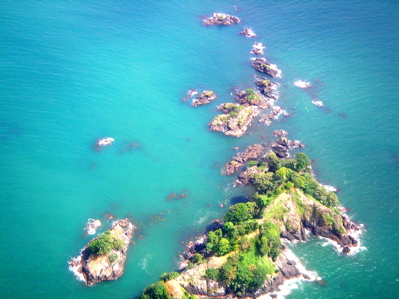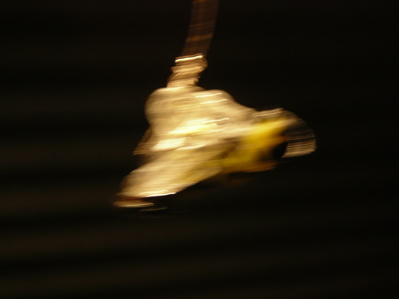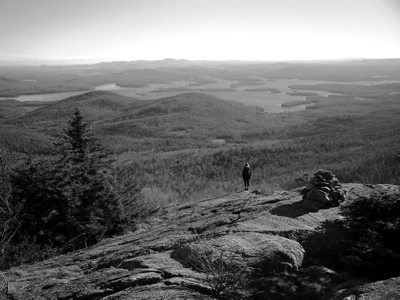13 December 2004 to 11 November 2004
¶ The Color of Money · 13 December 2004
My bank, which wasn't small or cozy when I opened a checking account there many years ago, has now merged up into a larger corporate megalith for the third time since I joined. My part of it was BayBank, which merged with Bank of Boston to become BankBoston, and then with Fleet Financial Group to become FleetBoston, and has now been acquired and absorbed by Bank of America, whose line of the merger chart is even bristlier.
The usual cynical view is that these changes are of little consequence to individuals. Fees go up, and levels of service go down, but that happens in non-merger years, too. You don't sign up with these banks because they're virtuous, you do because these banks are big. More specifically, you join them because they have ATMs everywhere you live.
And this is where the Bank of America change is actually startlingly significant, in a way that I doubt was ever raised in the merger negotiations. The previous three incarnations of this, the largest New England street-level banking presence, had different names but the same color. Ever since the ATM era began, the coolly luminous greenish-teal of the BayBank/BankBoston/Fleet signs has been an omnipresent component of the New England urban color scheme. Arguably it has been the single most distinctive brand element in a thoroughly branded visual environment. It has become the signal color of commercial critical-mass, the flag of normalized rules of exchange, and whether through coincidence or an obliquely enlightened collective consent, remarkably little other signage adopted and thus polluted the semantics of the hue. You could walk out onto a sidewalk in New England, look one way or the other to find the nearest glowing greenish-teal, and know immediately what sort of place you were standing in.
Bank of America's color is red. As the signs are changed, this time, the greenish-teal is being removed. Of course, whole signs were replaced the other times, too, so this change to red involves no more labor than the others. But it is the genius of evil to do more and more-permanent damage with the same small gestures. Red is bright, but overwhelmingly banal. There are countless other red signs, everywhere, and the new Bank of America signs are thus effectively swallowed and invisible. Where the old signs defined and delineated commercial presence, the new ones herald nothing but oblivious intruding anonymity. In replacing something with nothing, Bank of America has ripped little holes out of thousands of intersections and squares and centers across New England.
Of course, it doesn't really matter. Greenish-teal was not a moral quality, and distinctiveness is not an inherent good. I should have found a better bank long ago. Visual coherence in the built environment should be neither the responsibility nor the privilege of ATM signage. We are used to this process in New England, greens turning to reds in a thousand little flares of temporary death.
The usual cynical view is that these changes are of little consequence to individuals. Fees go up, and levels of service go down, but that happens in non-merger years, too. You don't sign up with these banks because they're virtuous, you do because these banks are big. More specifically, you join them because they have ATMs everywhere you live.
And this is where the Bank of America change is actually startlingly significant, in a way that I doubt was ever raised in the merger negotiations. The previous three incarnations of this, the largest New England street-level banking presence, had different names but the same color. Ever since the ATM era began, the coolly luminous greenish-teal of the BayBank/BankBoston/Fleet signs has been an omnipresent component of the New England urban color scheme. Arguably it has been the single most distinctive brand element in a thoroughly branded visual environment. It has become the signal color of commercial critical-mass, the flag of normalized rules of exchange, and whether through coincidence or an obliquely enlightened collective consent, remarkably little other signage adopted and thus polluted the semantics of the hue. You could walk out onto a sidewalk in New England, look one way or the other to find the nearest glowing greenish-teal, and know immediately what sort of place you were standing in.
Bank of America's color is red. As the signs are changed, this time, the greenish-teal is being removed. Of course, whole signs were replaced the other times, too, so this change to red involves no more labor than the others. But it is the genius of evil to do more and more-permanent damage with the same small gestures. Red is bright, but overwhelmingly banal. There are countless other red signs, everywhere, and the new Bank of America signs are thus effectively swallowed and invisible. Where the old signs defined and delineated commercial presence, the new ones herald nothing but oblivious intruding anonymity. In replacing something with nothing, Bank of America has ripped little holes out of thousands of intersections and squares and centers across New England.
Of course, it doesn't really matter. Greenish-teal was not a moral quality, and distinctiveness is not an inherent good. I should have found a better bank long ago. Visual coherence in the built environment should be neither the responsibility nor the privilege of ATM signage. We are used to this process in New England, greens turning to reds in a thousand little flares of temporary death.
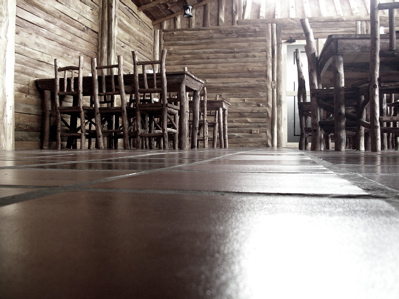
Freddo Fresas, Alajuela
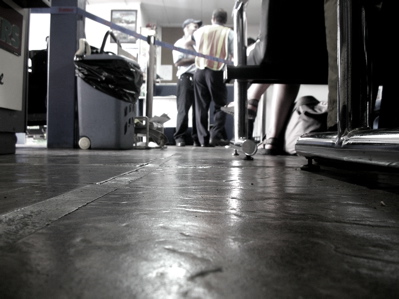
Juan Santamaria International Airport (Sansa), San Jose
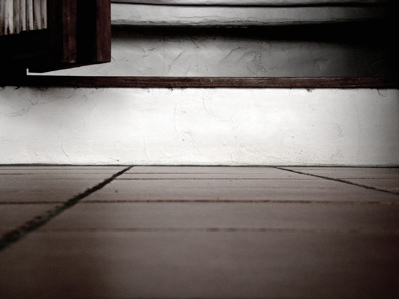
Cabina Gecko, Bosque del Cabo
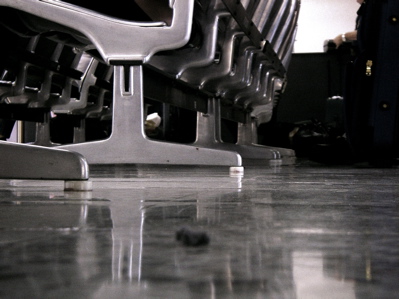
Comalapa International Airport, San Salvador
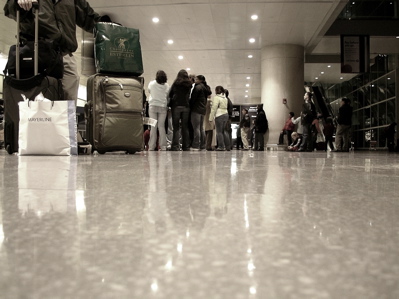
General Edward Lawrence Logan International Airport, Boston
¶ 2 December 2004
It's so gray here, and although I often don't understand people when I talk to them here, too, somehow it isn't fun.
Her skin glows at the edges, and we are never going to be here again today. Our margins are made of air, our hearts of water, and the ice is tuned to songs we used to know. Dissipation and spark flutter, and never touch our walls. And we are held in these postures. Whatever you see in that light, I know truer lines. And we are secure in these doubts, and safe in evanescent homes. And you are finally asleep.
¶ ten notes towards a moral grounding for the human government of a shared planet · 11 November 2004 essay
1. Human government is the mechanism for the manifestation of collective conscience, and thus the means by which we overcome both the intrinsic limitations and deliberate sociopathies of individual and group self-interest.
2. Human government ultimately serves only two ends: foremost, the preservation of life; secondarily, and only where it can be pursued without compromising the first, the protection of individual self-aware creatures' fundamental right of peaceful self-determination.
3. As long as the body of human religious belief is internally inconsistent, human government must derive from its own explicitly secular moral principles, and must conduct its moral reasoning entirely on the bases of observable material and mortal reality.
4. Human government should, and may only, be subdivided as a means for more effectively preserving lives or extending the right of peaceful self-determination within unique contexts. Local governments form and exist to apply global principles to local circumstances. Subdivisions of government remain universally subject to the same moral imperatives and constraints as human government as a whole, and thus may only legislate variant morality as expressions of peaceful self-determination within groups of individuals entirely and voluntarily self-constituted in informed consent. Neither presence nor birth may be construed as implicit waiving of any right, thus variant moralities may never be imposed on adolescents or over physical territories not populated entirely by consensus.
5. All tactical current moral reasoning must recognize that morality properly expands in all dimensions over time, and thus should anticipate wherever possible that current exceptions will become historical anomalies in whole or in part. Expedient mechanisms will and must evolve towards sustainability. Human government will inexorably become more global, more pervasively secular, more morally uniform and more intricately enlightened. Moral progress consists of the extension of the right of peaceful self-determination more completely, and to more creatures. Variant moralities will shift steadily from the domain of social mechanism into the domain of personal expression. We will increasingly live according to what we know, and imagine according to what we believe.
6. In the short term, much of the mechanism of modern human government will be dedicated to three major efforts: the support and development of currently unself-determining populations; the incorporation and normalization of local variant moralities; and the imposition of social conscience onto myopically unself-aware commerce. These projects are inherently remedial and self-eliminating. In a mature society, there are no local shortages of global surpluses, no local justifications for moral inequity, and no tolerances for systemic amorality or immorality in any human institutions.
7. In the longer term, government will increasingly be dedicated to two categories of more progressive endeavor: the ongoing and systemic mediation of conflicts that are by their nature irresolvable by well-intentioned participants, and the support of human-valuable activities for which society otherwise provides insufficient immediate rewards.
8. The transcendence of local self-interest is currently the preeminent human moral imperative, subordinate only to physical survival for individuals and groups, and superior to survival for organizations. A unified human government will only be formed by the transformative surrender of local autonomy by currently divided nations, the acceptance of significant social responsibility by corporations with significant social impact, and the recognition of the necessity of secular public morality by institutions of religion. From the most insularly privileged must come the most inspiring sacrifices.
9. The reformation of local institutions can only be effected by the moral cognizance and deliberate actions of individuals within them. It is the primary daily moral responsibility of individuals working in institutions to facilitate and encourage their institutions' acceptance of institutional moral responsibility.
10. A society's moral failures are ultimately a function, however indirectly, of the component immoralities its individuals rationalize or excuse. An individual's survival, expression and peaceful self-determination take place, even to the most trivial particular, within the omnipresent context of global human society and morality. All of our words and actions inevitably comprise moral assertions. Self-awareness is, by definition, a collective art for which we are our own audience. We must live in the understanding that our existences are stories we tell ourselves of how we think we should be. We must transcend the stories we have suffered from believing, and live the new stories we need to be true.
2. Human government ultimately serves only two ends: foremost, the preservation of life; secondarily, and only where it can be pursued without compromising the first, the protection of individual self-aware creatures' fundamental right of peaceful self-determination.
3. As long as the body of human religious belief is internally inconsistent, human government must derive from its own explicitly secular moral principles, and must conduct its moral reasoning entirely on the bases of observable material and mortal reality.
4. Human government should, and may only, be subdivided as a means for more effectively preserving lives or extending the right of peaceful self-determination within unique contexts. Local governments form and exist to apply global principles to local circumstances. Subdivisions of government remain universally subject to the same moral imperatives and constraints as human government as a whole, and thus may only legislate variant morality as expressions of peaceful self-determination within groups of individuals entirely and voluntarily self-constituted in informed consent. Neither presence nor birth may be construed as implicit waiving of any right, thus variant moralities may never be imposed on adolescents or over physical territories not populated entirely by consensus.
5. All tactical current moral reasoning must recognize that morality properly expands in all dimensions over time, and thus should anticipate wherever possible that current exceptions will become historical anomalies in whole or in part. Expedient mechanisms will and must evolve towards sustainability. Human government will inexorably become more global, more pervasively secular, more morally uniform and more intricately enlightened. Moral progress consists of the extension of the right of peaceful self-determination more completely, and to more creatures. Variant moralities will shift steadily from the domain of social mechanism into the domain of personal expression. We will increasingly live according to what we know, and imagine according to what we believe.
6. In the short term, much of the mechanism of modern human government will be dedicated to three major efforts: the support and development of currently unself-determining populations; the incorporation and normalization of local variant moralities; and the imposition of social conscience onto myopically unself-aware commerce. These projects are inherently remedial and self-eliminating. In a mature society, there are no local shortages of global surpluses, no local justifications for moral inequity, and no tolerances for systemic amorality or immorality in any human institutions.
7. In the longer term, government will increasingly be dedicated to two categories of more progressive endeavor: the ongoing and systemic mediation of conflicts that are by their nature irresolvable by well-intentioned participants, and the support of human-valuable activities for which society otherwise provides insufficient immediate rewards.
8. The transcendence of local self-interest is currently the preeminent human moral imperative, subordinate only to physical survival for individuals and groups, and superior to survival for organizations. A unified human government will only be formed by the transformative surrender of local autonomy by currently divided nations, the acceptance of significant social responsibility by corporations with significant social impact, and the recognition of the necessity of secular public morality by institutions of religion. From the most insularly privileged must come the most inspiring sacrifices.
9. The reformation of local institutions can only be effected by the moral cognizance and deliberate actions of individuals within them. It is the primary daily moral responsibility of individuals working in institutions to facilitate and encourage their institutions' acceptance of institutional moral responsibility.
10. A society's moral failures are ultimately a function, however indirectly, of the component immoralities its individuals rationalize or excuse. An individual's survival, expression and peaceful self-determination take place, even to the most trivial particular, within the omnipresent context of global human society and morality. All of our words and actions inevitably comprise moral assertions. Self-awareness is, by definition, a collective art for which we are our own audience. We must live in the understanding that our existences are stories we tell ourselves of how we think we should be. We must transcend the stories we have suffered from believing, and live the new stories we need to be true.

